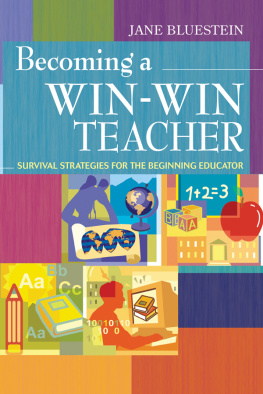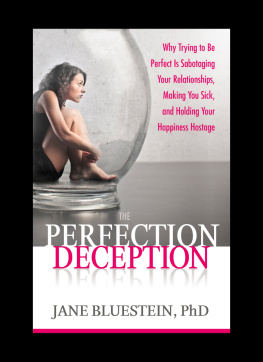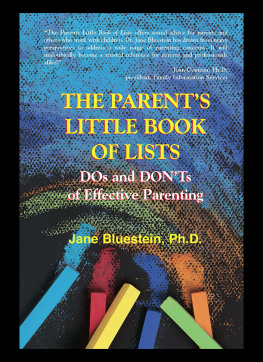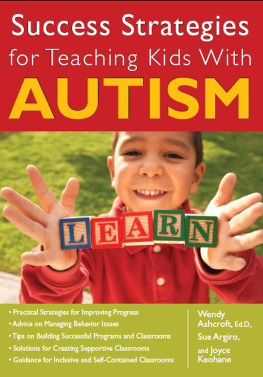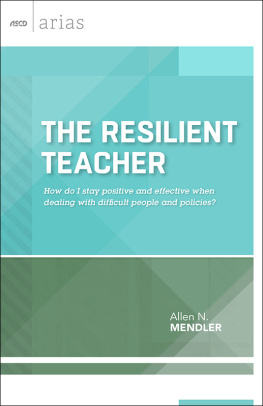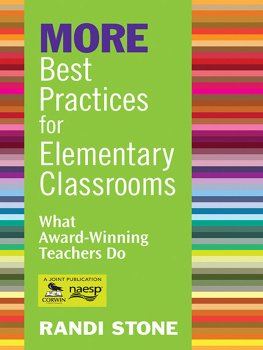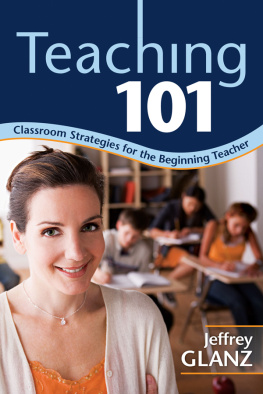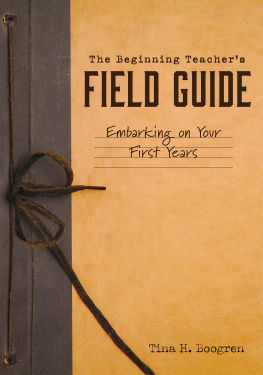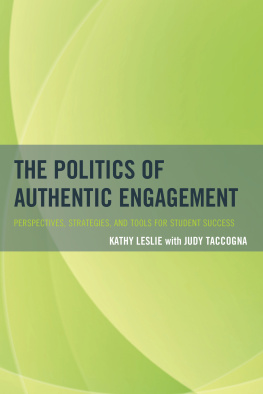To Marian Morris and Anne Marshallintern program coordinators, resources, support people, and witnesses to my first year. With gratitude .
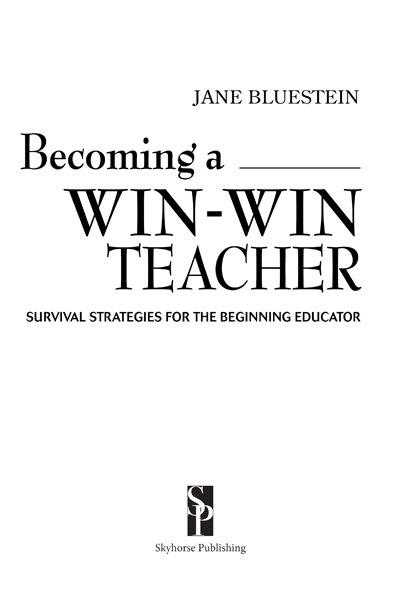
Copyright 2010 by Jane Bluestein.
First Skyhorse Publishing edition 2015.
All rights reserved. No part of this book may be reproduced in any manner without the express written consent of the publisher, except in the case of brief excerpts in critical reviews or articles. All inquiries should be addressed to Skyhorse Publishing, 307 West 36th Street, 11th Floor, New York, NY 10018.
Skyhorse Publishing books may be purchased in bulk at special discounts for sales promotion, corporate gifts, fund-raising, or educational purposes. Special editions can also be created to specifications. For details, contact the Special Sales Department, Skyhorse Publishing, 307 West 36th Street, 11th Floor, New York, NY 10018 or info@skyhorsepublishing.com.
Skyhorse and Skyhorse Publishing are registered trademarks of Skyhorse Publishing, Inc., a Delaware corporation.
Visit our website at www.skyhorsepublishing.com.
10 9 8 7 6 5 4 3 2 1
Library of Congress Cataloging-in-Publication Data is available on file.
Cover design by Michael Dubowe
Print ISBN: 978-1-63220-541-4
Ebook ISBN: 978-1-63220-958-0
Printed in the United States of America
Contents
About the Author
A dynamic and entertaining speaker, Dr. Jane Bluestein has worked with thousands of educators, counselors, healthcare professionals, parents, childcare workers, and other community members worldwide. She has appeared internationally as a speaker and talk-show guest, including several appearances as a guest expert on CNN, National Public Radio , and The Oprah Winfrey Show .
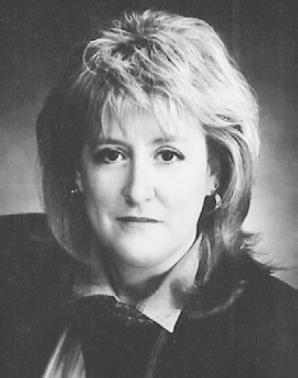
Dr. Bluestein specializes in programs and resources geared to provide practical and meaningful information, training, and hope in areas related to relationship building, effective instruction and guidance, and personal development. Much of her work focuses on interactions between adults and children, especially children at risk. Her down-to-earth speaking style, practicality, sense of humor, and numerous stories and examples make her ideas clear and accessible to her audiences.
Dr. Bluestein is an award-winning author whose books include Creating Emotionally Safe Schools; High Schools Not Forever; 21st Century Discipline; Being a Successful Teacher; Parents, Teens, and Boundaries; The Parents Little Book of Lists: Dos and Donts of Effective Parenting; Mentors, Masters, and Mrs. McGregor: Stories of Teachers Making a Difference ; and Magic, Miracles & Synchronicity: A Journal of Gratitude and Awareness . Dr. Bluesteins latest books include The Win-Win Classroom and a companion facilitators guide.
Formerly a classroom teacher in inner-city Pittsburgh, Pennsylvania, crisis-intervention counselor, teacher training program coordinator, and volunteer with high-risk teens at a local day treatment program, Dr. Bluestein currently heads Instructional Support Services, Inc., a consulting and resource firm in Albuquerque, New Mexico.
Her words will touch your heart;
her ideas will change your life.
Prologue:
Why I Teach
I f you had asked me back in the beginning to tell you why I teach, I dont know how I might have answered. It wasnt the moneyback in my days as a teaching intern, I was bringing home a mere $318 a month, which wasnt much, even then. It wasnt the hoursbetween graduate school and losing the battle to stay one step ahead of my thirty-nine fifth-graders, I was putting in ridiculously long days. And it certainly wasnt the chance to exercise my genius as an instructorI was lucky if I could get through one day without a fight breaking out.
No, there wasnt much glory in working with kids who greeted me with, I dont do reading, before Id had a chance to learn their names. Nor was it heartwarming to teach kids who saw me more as an annoyance than an inspiration, kids who couldnt care less that all Id ever wanted my entire life was to be a teacher.
I cried a lot my first year. I cried the day my whole class failed what I thought was a simple pretest. I cried the day my kids wouldnt sit down and be quiet while my supervisor was in the room. I cried the day a parent said that maybe her son would do better with an older teacher. And I cried the day I visited the home of one of my most difficult students and found her mother falling-down drunk before lunchtime.
So what kept me in the game, especially that first year? Looking back, it took remarkably little to renew my sense of hope, or at least suggest that maybe all was not lost. I would come this close to throwing in the towel when a child would uncharacteristically come to class prepared, make a positive behavioral change, or help a classmate. Id be sure I couldnt make it through the day when someone would suddenly get subtraction or appear excited about a subject we were about to discuss. And just as I was about to give up, theyd finally sit still for a story or laugh at one of my jokes.
For other teachers, perhaps its the progress, imperceptible as it may seem at times, the little connections, a hug here and there, or the realization that we might well be the only source of encouragement some child is getting right now. Perhaps deep down theres the possibility that our excitement, or even our good intentions, somehow makes a dent, that our caring and commitment allow us, inevitably, to touch the future. But we give what we give because we cant not give, and we give in the best of faith, because the evidence of our devotion is sometimes long in coming. We are tested again and again, and sometimes we just keep coming back for no good reason besides the fact that, for better or worse, we are called to teach. Maybe this is something only another teacher can understand: Its not just what we do. Its who we are.
Introduction
I n retrospect, I was one of the lucky ones. I did my student teaching and first-year internship at two tough inner-city schools, the professional equivalent of learning to swim by jumping off a ship a mile from shore. As solid as my teacher training classes had been, I discovered a number of gaping holes in my preparation once I was actually facing my students for the first time. At the very least, I was surprised to discover that the majority of my students were not easily engaged, self-managing, traditional learners who wanted to be there and who wanted to learnthe very students I had been trained to teach. So much of what I had learned prior to my work with real live students wasnt as helpful as I would have liked.
There were so many things about the profession that were never mentioned or discussed in my training. I knew a lot about teaching, but I didnt know anywhere near what I needed to know about the culture of the profession I was entering. Having a good grasp of curriculum, scope and sequence, or the effective use of instructional activities and materials was small comfort when up against the emotional defenses and apparent indifference of students whose previous school experiences were laced, to varying degrees, with discouragement and failure.
Likewise, my instructional skills didnt help prepare me for the challenges of becoming a part of the adult community at school. And I dont remember anything that would have helped me to develop the flexibility, resiliency, people skills, or sense of humor Id needor even to appreciate how important these qualities would be. As comprehensive as my training may have been, if there was any instruction that would have helped me deal with the politics of the workplace, recognize the hidden agendas of colleagues and administrators, anticipate the range of cognitive and social realities I would encounter in my students and their families, or even learn how to function as an adult and professional in a school, I was apparently absent that day.

